英语毕业论文 论中国的英语教育
中英教育的对比英语作文

中英教育的对比英语作文Here is an English essay on the comparison between Chinese and English education, with the content exceeding 1000 words as requested. There is no title in the main body of the text, and no extra punctuation marks have been included.Education plays a crucial role in shaping the future of individuals and societies. The way education is delivered and the values it instills can have a profound impact on the development of a nation. When it comes to the education systems of China and the English-speaking world, there are significant differences that reflect the unique cultural, historical, and sociopolitical contexts of these regions.One of the most striking differences between the Chinese and English education systems is the emphasis on examinations and academic performance. In China, the education system is heavily focused on standardized testing, with the infamous gaokao or national college entrance examination being the pinnacle of a student's academic journey. This exam-oriented approach places immense pressure on students to excel academically, often at the expense of well-rounded development and the pursuit of personal interests. The belief that academic success, as measured by testscores, is the primary determinant of one's future prospects is deeply ingrained in the Chinese psyche.In contrast, the English-speaking education systems, particularly in countries like the United States and the United Kingdom, have traditionally placed greater emphasis on a more holistic approach to learning. While academic achievement is still highly valued, there is a greater emphasis on developing critical thinking skills, fostering creativity, and encouraging extracurricular activities. The goal is to produce well-rounded individuals who can adapt to the demands of the modern workforce and contribute to society in meaningful ways.Another key difference lies in the role of the teacher-student relationship. In the Chinese education system, the teacher is often seen as the ultimate authority figure, and students are expected to show unwavering respect and obedience. The teacher's word is taken as gospel, and questioning or challenging the teacher's instructions is generally frowned upon. This hierarchical structure reinforces the notion of the teacher as the sole source of knowledge, and students are expected to passively absorb the information presented to them.On the other hand, the English-speaking education systems tend to encourage a more collaborative and interactive learning environment. Teachers are often seen as facilitators, guiding students through the learning process and encouraging them to engage in criticaldiscourse. Students are encouraged to ask questions, express their opinions, and engage in discussions, fostering a sense of intellectual autonomy and independent thinking.The curriculum and teaching methods also differ significantly between the two education systems. In China, the curriculum is often highly standardized, with a strong emphasis on core academic subjects such as mathematics, science, and language arts. The teaching methods are typically lecture-based, with a focus on rote memorization and the mastery of specific skills and knowledge. This approach is aimed at ensuring that students acquire a solid foundation in the core academic disciplines, which are seen as the key to success in the highly competitive education and job markets.In contrast, the English-speaking education systems tend to be more flexible and adaptable, with a greater emphasis on interdisciplinary learning and the integration of different subject areas. Teaching methods often incorporate a variety of approaches, including project-based learning, problem-solving exercises, and collaborative group work. The goal is to develop critical thinking, problem-solving, and communication skills that can be applied across a range of contexts.Another notable difference is the role of extracurricular activities in the two education systems. In China, extracurricular activities areoften seen as secondary to academic pursuits, with students expected to devote the majority of their time and energy to studying and preparing for exams. Participation in sports, arts, or other extracurricular activities is often viewed as a distraction from the primary goal of academic excellence.In the English-speaking education systems, however, extracurricular activities are highly valued and actively encouraged. Schools often provide a wide range of opportunities for students to explore their interests and develop their talents outside the classroom, whetherit's through sports teams, arts programs, or student organizations. The belief is that these activities not only provide a much-needed balance to the academic workload but also help students develop essential life skills, such as teamwork, leadership, and time management.Finally, the role of parental involvement in the education process also differs significantly between the two systems. In China, parents are often highly involved in their children's education, closely monitoring their academic performance and exerting significant influence over their educational and career choices. The success of a child is seen as a reflection of the family's honor and social status, leading to intense pressure and expectations from parents.In the English-speaking education systems, the role of parents isoften more supportive and collaborative. While parents are still involved in their children's education, they are encouraged to work in partnership with the school and teachers, providing guidance and support but ultimately allowing the child to take ownership of their own learning and development.In conclusion, the comparison between the Chinese and English education systems reveals fundamental differences in their underlying philosophies, priorities, and approaches. While both systems strive to provide quality education, the cultural, historical, and sociopolitical contexts have shaped vastly different educational landscapes. As the world becomes increasingly interconnected, understanding these differences and exploring ways to learn from each other's strengths can lead to the development of more comprehensive and effective education systems that cater to the diverse needs of students in the 21st century.。
英语对中国教育的影响英语作文
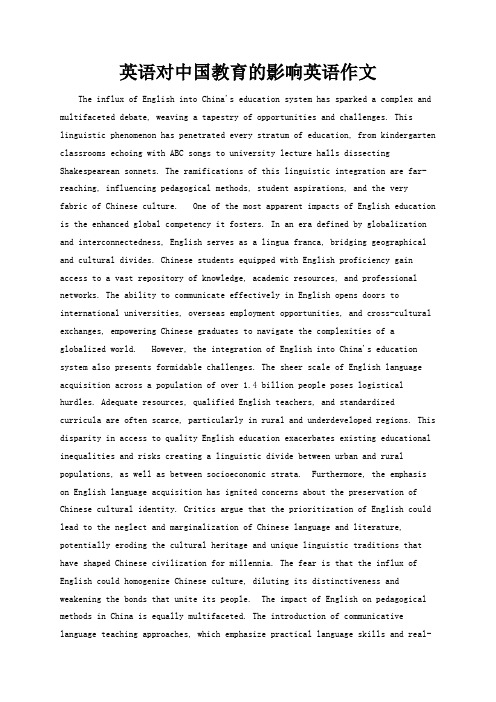
英语对中国教育的影响英语作文The influx of English into China's education system has sparked a complex and multifaceted debate, weaving a tapestry of opportunities and challenges. This linguistic phenomenon has penetrated every stratum of education, from kindergarten classrooms echoing with ABC songs to university lecture halls dissecting Shakespearean sonnets. The ramifications of this linguistic integration are far-reaching, influencing pedagogical methods, student aspirations, and the veryfabric of Chinese culture. One of the most apparent impacts of English education is the enhanced global competency it fosters. In an era defined by globalization and interconnectedness, English serves as a lingua franca, bridging geographical and cultural divides. Chinese students equipped with English proficiency gain access to a vast repository of knowledge, academic resources, and professional networks. The ability to communicate effectively in English opens doors to international universities, overseas employment opportunities, and cross-cultural exchanges, empowering Chinese graduates to navigate the complexities of a globalized world. However, the integration of English into China's education system also presents formidable challenges. The sheer scale of English language acquisition across a population of over 1.4 billion people poses logistical hurdles. Adequate resources, qualified English teachers, and standardizedcurricula are often scarce, particularly in rural and underdeveloped regions. This disparity in access to quality English education exacerbates existing educational inequalities and risks creating a linguistic divide between urban and rural populations, as well as between socioeconomic strata. Furthermore, the emphasis on English language acquisition has ignited concerns about the preservation of Chinese cultural identity. Critics argue that the prioritization of English could lead to the neglect and marginalization of Chinese language and literature, potentially eroding the cultural heritage and unique linguistic traditions that have shaped Chinese civilization for millennia. The fear is that the influx of English could homogenize Chinese culture, diluting its distinctiveness and weakening the bonds that unite its people. The impact of English on pedagogical methods in China is equally multifaceted. The introduction of communicative language teaching approaches, which emphasize practical language skills and real-world application, has challenged traditional rote learning methods. While this shift has fostered greater student engagement and improved English communication skills, it has also encountered resistance from educators accustomed totraditional teaching styles and a curriculum focused on grammar and vocabulary drills. Moreover, the pressure to excel in English language examinations, such as the College English Test (CET), has led to a phenomenon known as "exam-oriented education." This approach often prioritizes test-taking strategies and memorization over genuine language acquisition, potentially hindering students' ability to effectively communicate and apply their English skills in real-world contexts. The influence of English extends beyond the classroom, shaping the aspirations and career trajectories of Chinese students. English proficiency has become a coveted skill in the Chinese job market, with many employers prioritizing candidates with strong English communication skills. This has led to a surge in demand for English language training and a proliferation of private English language schools and tutoring services. However, the commodification of English education has raised concerns about equity and access. The high cost of private English language instruction can be prohibitive for many families, particularly those from disadvantaged backgrounds, further exacerbating educationalinequalities and limiting social mobility. In conclusion, the impact of English on China's education system is a complex and multifaceted phenomenon, interwoven with opportunities and challenges. While English proficiency equips Chinese students with valuable skills for the globalized world, concerns remain about educational equity, cultural preservation, and pedagogical effectiveness. Navigating this linguistic landscape requires a nuanced approach that balances the benefits of English language acquisition with the preservation of Chinese cultural identity and the pursuit of equitable and quality education for all.。
毕业论文范文英语教育
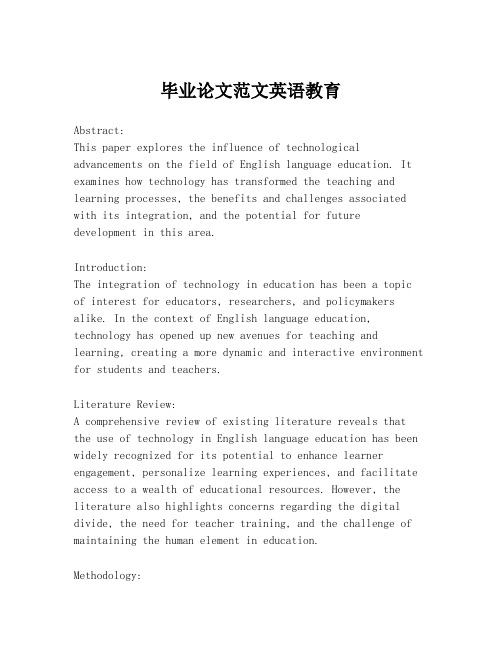
毕业论文范文英语教育Abstract:This paper explores the influence of technological advancements on the field of English language education. It examines how technology has transformed the teaching and learning processes, the benefits and challenges associated with its integration, and the potential for future development in this area.Introduction:The integration of technology in education has been a topic of interest for educators, researchers, and policymakers alike. In the context of English language education, technology has opened up new avenues for teaching and learning, creating a more dynamic and interactive environment for students and teachers.Literature Review:A comprehensive review of existing literature reveals that the use of technology in English language education has been widely recognized for its potential to enhance learner engagement, personalize learning experiences, and facilitate access to a wealth of educational resources. However, the literature also highlights concerns regarding the digital divide, the need for teacher training, and the challenge of maintaining the human element in education.Methodology:This study employs a mixed-methods approach, combining quantitative data from surveys of English language educators and students with qualitative data from interviews and classroom observations. The aim is to gain a holistic understanding of the impact of technology on English language education.Results:The findings indicate that technology has significantly improved the accessibility and efficiency of English language instruction. Students reported increased motivation and engagement due to the interactive nature of digital learning tools. However, the results also point to a need for ongoing professional development for educators to effectively integrate technology into their teaching practices.Discussion:The discussion section delves into the implications of the findings, considering the balance between leveraging technology and preserving the interpersonal aspects of language learning. It also addresses the challenges of ensuring equitable access to technology for all learners.Conclusion:In conclusion, the study underscores the positive impact of technology on English language education while acknowledging the need for careful implementation and ongoing support. As technology continues to evolve, it is imperative for educators to stay abreast of new developments and adapt their teaching strategies accordingly.Recommendations:Based on the study's findings, several recommendations are made. These include the need for increased investment in digital infrastructure, the provision of regular training for educators in the use of educational technology, and the development of policies that promote inclusive access to technology for all students.References:A comprehensive list of references is provided, citing the works of scholars and researchers who have contributed to the understanding of technology's role in English language education.Appendix:The appendix includes supplementary materials such as survey questionnaires, interview protocols, and classroom observation guidelines used in the study.。
对中国英语教育的若干思考
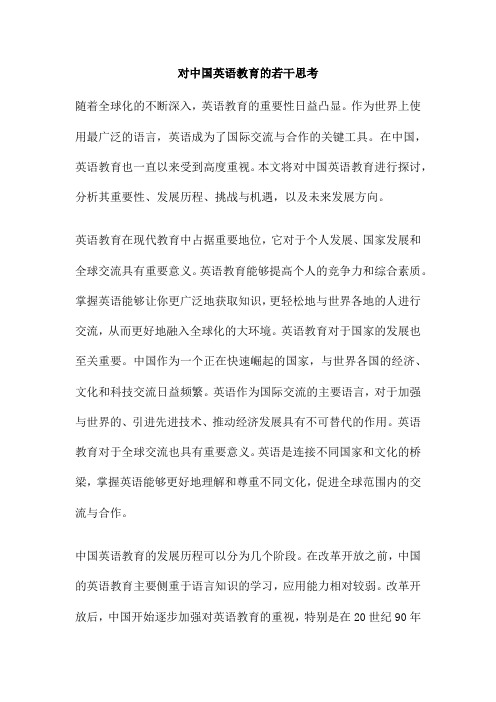
对中国英语教育的若干思考随着全球化的不断深入,英语教育的重要性日益凸显。
作为世界上使用最广泛的语言,英语成为了国际交流与合作的关键工具。
在中国,英语教育也一直以来受到高度重视。
本文将对中国英语教育进行探讨,分析其重要性、发展历程、挑战与机遇,以及未来发展方向。
英语教育在现代教育中占据重要地位,它对于个人发展、国家发展和全球交流具有重要意义。
英语教育能够提高个人的竞争力和综合素质。
掌握英语能够让你更广泛地获取知识,更轻松地与世界各地的人进行交流,从而更好地融入全球化的大环境。
英语教育对于国家的发展也至关重要。
中国作为一个正在快速崛起的国家,与世界各国的经济、文化和科技交流日益频繁。
英语作为国际交流的主要语言,对于加强与世界的、引进先进技术、推动经济发展具有不可替代的作用。
英语教育对于全球交流也具有重要意义。
英语是连接不同国家和文化的桥梁,掌握英语能够更好地理解和尊重不同文化,促进全球范围内的交流与合作。
中国英语教育的发展历程可以分为几个阶段。
在改革开放之前,中国的英语教育主要侧重于语言知识的学习,应用能力相对较弱。
改革开放后,中国开始逐步加强对英语教育的重视,特别是在20世纪90年代以来,英语教育得到了快速发展和普及。
目前,中国的英语教育已经形成了从幼儿教育到高等教育、从普通教育到职业教育的完整体系。
尽管中国英语教育已经取得了长足进步,但仍面临着一些挑战和机遇。
英语教育资源分配不均是一个重要问题。
一些大城市和发达地区的英语教育资源丰富,而一些农村和欠发达地区的资源相对匮乏。
这可能导致不同地区的学生在英语教育方面的差距加大。
教育方式多样化不足。
虽然现代教育技术不断发展,但一些学校仍然采用传统的课堂教学方式,难以激发学生的学习兴趣和主动性。
国际交流的机会较少。
虽然中国已经加入了世界贸易组织等国际组织,但学生国际交流的机会仍相对较少,这限制了学生拓展视野、提高跨文化交流能力。
面对挑战和机遇,中国英语教育需要不断优化和发展。
英语专业毕业论文初稿

英语专业毕业论文初稿第一篇:英语专业毕业论文初稿Comparison of Family Education between China and theUSATable of ContentsAbstract in English-----------------1 Key words in English-------------1 Abstract in Chinese---------------1 Key words in Chinese-------------1 Ⅰ.Introduction---------------------2 Ⅱ.Differences of Family education in China and the USA--21.Family Education in China------22.Family Education in the USA-33.Our attitudes---------------------3 Ⅲ.Conclusion----------------------8 Bibliography------------------------9共6页,1000字AbstractBecause of the historical background, cultural and other differences, so the United States education in the family there is a great difference.Americans pay attention to cultivating the ability of the child's independence and awareness, and the parents of the Chinese habit of planning everything for their children, their children to act in accordance with the plans and do things behave.We should correctly understand and learn from foreign advanced educational methods, to learn the benefits of family education in the West, combined with family education in China in the past, as soon as possible to find a new, more suitable for a good Chinese education.Keywords:family education, independence , differences摘要由于历史背景,文化等的差异,所以中美在家庭教育方面存在着很大差异。
英语作文对中国教育
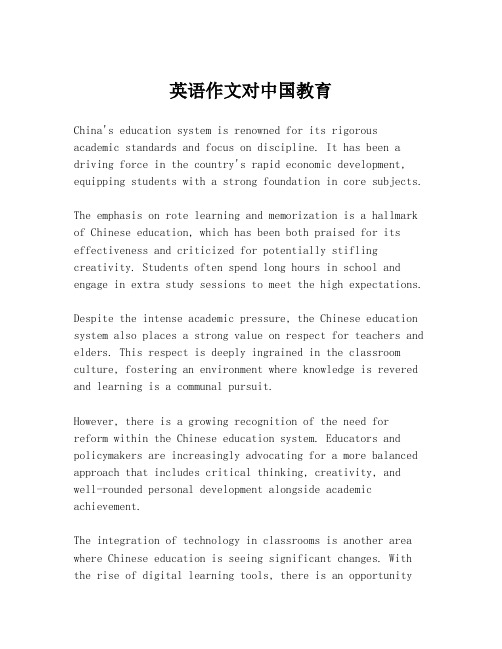
英语作文对中国教育China's education system is renowned for its rigorous academic standards and focus on discipline. It has been a driving force in the country's rapid economic development, equipping students with a strong foundation in core subjects.The emphasis on rote learning and memorization is a hallmark of Chinese education, which has been both praised for its effectiveness and criticized for potentially stifling creativity. Students often spend long hours in school and engage in extra study sessions to meet the high expectations.Despite the intense academic pressure, the Chinese education system also places a strong value on respect for teachers and elders. This respect is deeply ingrained in the classroom culture, fostering an environment where knowledge is revered and learning is a communal pursuit.However, there is a growing recognition of the need for reform within the Chinese education system. Educators and policymakers are increasingly advocating for a more balanced approach that includes critical thinking, creativity, and well-rounded personal development alongside academic achievement.The integration of technology in classrooms is another area where Chinese education is seeing significant changes. With the rise of digital learning tools, there is an opportunityto enhance the learning experience and prepare students for the challenges of the future.In conclusion, the Chinese education system is a complex and evolving landscape. It is a testament to the country's commitment to academic excellence, while also reflecting the ongoing dialogue about the best way to educate the next generation.。
综论我国的英语教育

外 语教育 , 别地 区的外语教育甚至为空 白状态 , 使教 出 个 即
来 的学 生所 讲 的英 语 外 语 也 是 南 腔 北 凋 , 音 极 不 规 范 。而 发 师 资 力 量 的 匮乏 直接 影 响 了教 师 业 务 水 平 的 提 高 , 多数 教 大 师 根本 就 没 有进 修 的机 会 , 没有 精 力 和 能 力 来 从 事 科 学 研 更 究 。再 加 上 师 生 比例 严 重 失 调 而造 成 教 学 班级 过 大 , 、 十 六 七
高, 只要 他 没 能 通 过 相 应 的 英 语 等 级 考 试 , 不 可 能 获 得 相 就
应 的 专 业 技 术 职 称 , 也 就 意 味 着 他 的工 资 、 这 医疗 和住 房 等 条 件 不 可 能得 到改 善 。所 以说 , 语 考 试 与 每 个 人 的前 途 和 外 经 济 利益 密切 联 系 在 一 起 , 为任 何 一 个 想 要 改 变 自己命 运 成 的人 所 必 须 跨 越 的 门槛 。 应 试 教 育 严 重 地 扭 曲 了 正 常 的英 语 教 学 , 生 们 忙 于 背 学
为 “ 位 课 程 ” 学 生 在 毕 业 时 若 没 能 通 过 该 项 考试 , 不 能 学 , 就
获得 学 士 学 位 。 因此 , 生 们 都 将 “ 学 英 语 四 级 考试 ” 0分 学 大 6 ( 目前 是 4 5分 ) 2 当作 获 取 学 位证 书 的“ 死 线 ” 生 。
除 了学 生 要 长 期 经 受 考 试 的 煎 熬 , 师 、 生 、 师 、 教 医 律 科
年 外 语 之后 , 识 一些 单 词 就 算 不错 了 。许 多 大学 毕 业 生 ( 认 包 括 研 究 生 ) 走上 社 会 后 还 要 补 习英 语 。 如 此 的学 习效 果 自 在 然 要 受 到 大 家 的质 疑 , 中 有 的 言 辞 颇 为 尖 锐 : 为 我 国教 其 作
【毕业论文选题】英语教育毕业论文题目
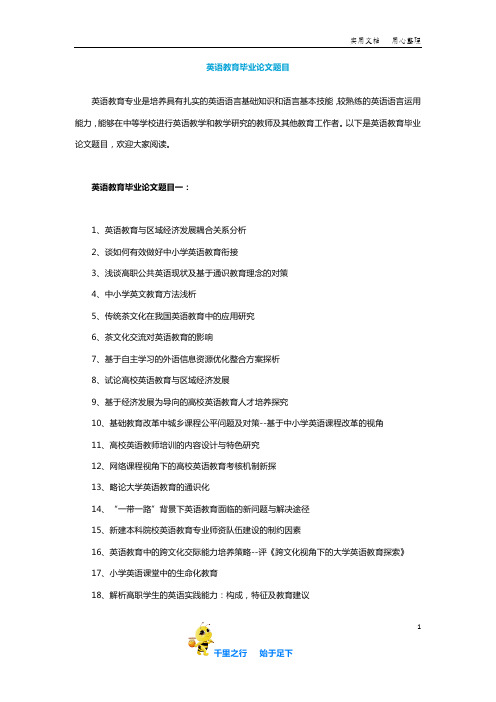
英语教育毕业论文题目英语教育专业是培养具有扎实的英语语言基础知识和语言基本技能,较熟练的英语语言运用能力,能够在中等学校进行英语教学和教学研究的教师及其他教育工作者。
以下是英语教育毕业论文题目,欢迎大家阅读。
英语教育毕业论文题目一:1、英语教育与区域经济发展耦合关系分析2、谈如何有效做好中小学英语教育衔接3、浅谈高职公共英语现状及基于通识教育理念的对策4、中小学英文教育方法浅析5、传统茶文化在我国英语教育中的应用研究6、茶文化交流对英语教育的影响7、基于自主学习的外语信息资源优化整合方案探析8、试论高校英语教育与区域经济发展9、基于经济发展为导向的高校英语教育人才培养探究10、基础教育改革中城乡课程公平问题及对策--基于中小学英语课程改革的视角11、高校英语教师培训的内容设计与特色研究12、网络课程视角下的高校英语教育考核机制新探13、略论大学英语教育的通识化14、“一带一路”背景下英语教育面临的新问题与解决途径15、新建本科院校英语教育专业师资队伍建设的制约因素16、英语教育中的跨文化交际能力培养策略--评《跨文化视角下的大学英语教育探索》17、小学英语课堂中的生命化教育18、解析高职学生的英语实践能力:构成,特征及教育建议119、语块记忆方法对英语听力能力发展的有效性分析20、浅谈大学英语教学在素质教育中的作用21、从英语的经济价值看我国高校英语跨文化教育22、中西方远程网络教育下大学生英语自主学习能力研究23、慕课视阈下大学生英语自主学习能力的培养24、“互联网+”下高校英语专业教育与人才培养的思路探析25、语言经济学视角下民族地区英语教育发展研究26、大学英语教育中国文化失语现象研究27、在生活中收获知识--浅谈小学英语教育生活化28、学前教育专业英语学习现状及解决策略29、创新创业教育背景下的大学英语自主学习30、幼小英语教育衔接的现状及问题31、语料库语言学视阈下的大学英语教材词汇研究32、基础英语教育的育人价值探究33、试论大学英语教育要着眼于学生英语综合应用能力的培养34、论高校英语教育实用功能的强化--以资源优化理论为视角35、新形势下我国大学英语教育之困境及改革发展之路36、核心素养视野下的小学英语绘本阅读教育英语教育毕业论文题目二:37、“一带一路”背景下高职院校外语教育策略38、高校英语教育中文化意识培养策略与实践39、大学英语教育教学改革实践路径分析--以河北经贸大学为例40、大学英语教育在传媒信息时代发展的新策略41、谈以爱国主义文化认同教育为宗旨的英语教育文化导入242、大学英语教育改革之我见43、大数据对英语教育的影响分析--论在英语教学中大数据的运用44、传媒信息时代下的大学英语教育创新探究45、生成观视域下的英语教育分析46、从文化变迁看高校英语教育的“中国文化失语”47、日本小学英语教育研究及启示48、对我国幼儿英语教育可行性及开展策略的思考49、大学英语教育中母语文化缺失问题与回归方式探索50、我国英语教育中的母语安全研究51、基于微课堂的英语教育改革方法探析52、分类卓越--新形势下大学英语教育的发展策略53、DBAE理论视域下的高职英语教育研究54、语言经济学视角下的一个中国式家庭英语教育的投入与产出--以安徽省为例55、语言经济学视域下的我国英语教育产业化56、21世纪日本小学英语教育研究57、五年一贯制高职英语教育现状及教学方法探讨58、核心素养课改下的基础英语教育回顾与展望59、内蒙古自治区牧区小学英语教育改进策略探究60、论大学英语教育中本土文化的缺乏及其对策61、和田地区双语教育现状及英语教育前景分析62、基于移动学习模式的大学英语教育生态系统研究63、浅析茶文化对大学英语教育开展的价值与作用64、我国农村地区中学英语教育现状与途径探析65、高考英语改革背景下的高职英语教育研究66、试析传媒信息时代的大学英语教育创新67、农村中学英语教育现状与途径探析368、多维视角下的西部中学英语教育69、谈小学英语教育的发展趋势70、冲突与交融:民国时期英语教育的特点及其社会影响--以江南地区为研究对象71、教育生态学视角下的英语教育改革路径72、语言全球化背景下大学英语教育问题探析英语教育毕业论文题目三:73、国内外核心素养研究及对小学英语教育发展的启示74、论英语教育的教学方法及革新75、高校英语教育中存在的问题及对策研究76、中日韩三国基础英语教育改革比较77、浅论小学英语教育低龄化问题78、民族地区英语教育中民族学生的文化心理引导79、小学英语教育当中的情感教育80、基于网络环境下青藏地区大学英语教育模式存在的问题与对策--以青海大学为例81、MOOC下的中国职业英语教育改革探索与应对82、人才复合型发展中高校英语教育模式新表征83、基于产出导向的大学英语教育系统重构84、茶香西行渐进--寻找英语教育中的茶文化85、浅谈“慕课”(MOOCs)浪潮下大学英语教育的现状与发展契机86、学前儿童英语教育方法的研究--以游戏兴趣法为例87、艺术院校英语教育中的文化认同与文化自觉88、英语教育初小衔接研究89、初中英语教学中美育教育现状研究90、民国时期苏南家族学校英语教育研究91、英语教育与非教育专业硕士对教师职业认同态度的对比研究492、基于现代教育技术手段提高丽江纳西族小学生英语听说读写能力的研究93、生本教育理念下的初中英语有效教学探究94、吉尔吉斯斯坦比什凯克市幼儿园英语教育调查研究95、从中西茶文化的差异看大学英语教育96、全球化时代背景下的日本外语教育战略--培养日本国民的英语交际能力97、少数民族学生英语教育优化的跨文化视角98、谈中国英语教育的转型99、内蒙古地区蒙古族英语教育的研究现状分析100、亚洲英语教育的历史演变及作用101、文化自觉时代高校英语教育中的中国文化素养102、洋务运动时期西学东渐对高校英语教育发展影响研究103、英语教育中的情感教育对策104、大学英语教育中的跨文化交际能力培养策略105、互联网背景下高等师范学校英语教育硕士学情调查研究106、教育生态学视域下大学英语生态课堂的优化策略研究107、基于能力本位教育理论的多元商务英语能力探究108、教育实习对职前英语教师自我效能感的影响探究英语教育毕业论文题目四:109、民国时期商务印书馆出版业促进中学英语教育发展研究110、新型城镇化背景下我国农村中小学英语教育探微--基于吉林省的调查与研究111、少数民族地区大学英语教育的不利因素与对策研究112、教育信息化背景下大学英语教师教育技术能力现状研究报告--以南京地方高校为例113、民办教育培训机构中幼儿英语教育的现状与问题研究--以河南省Z市J区为例114、探析我国高校英语教育中中国文化失语现象及应对措施5115、粤北地区幼儿英语教育现状及原因分析116、以大学生职业素养为导向的英语教育本土化117、语言教育规划视角下大学英语教育发展对策研究118、19世纪的日本英语教育及启示119、关键期假设视角下的幼儿英语教育目标定位120、论英语教育专业学生跨文化交际能力的培养121、基于民族学生心理语言距离的英语教育策略122、关于小学英语教育的思考123、如何在高职英语教育中渗透素质教育124、论基于就业导向的高职英语教育模式及构想125、中国文化元素融入高职英语教育的对策研究126、新媒体视角下英语教育的创新发展对策127、英语教育促进思维品质发展的内涵与可能128、冶金出口贸易中的英语教育培养的特殊性分析129、中国英语教育与民族文化复兴130、近代中国教会学校英语教育的宗教意涵131、浅谈“人文精神”缺失对高职英语教育的影响132、小学英语教育现状反思与对策133、少数民族地区英语教育生态环境建设研究--基于教育生态学视角134、学术英语教育对大学生就业的影响研究135、大连市幼儿英语教育的现状分析及建议136、运用冲突理论构建大学英语教育的和谐生态系统137、学前英语教育现状与对策138、高等英语教育中批判教育模式的实用性与适用性139、中美幼儿英语教育方法的比较分析140、中国英语教育的发展与未来6141、浅析英语教育事业的发展142、芬兰、韩国英语教育变革对我国英语教育模式的启示143、论大学英语教育与中国文化的传承和传播144、浅谈小学英语教育中的创造教育145、新课标背景下初中英语课堂教学中融入价值教育的研究7。
- 1、下载文档前请自行甄别文档内容的完整性,平台不提供额外的编辑、内容补充、找答案等附加服务。
- 2、"仅部分预览"的文档,不可在线预览部分如存在完整性等问题,可反馈申请退款(可完整预览的文档不适用该条件!)。
- 3、如文档侵犯您的权益,请联系客服反馈,我们会尽快为您处理(人工客服工作时间:9:00-18:30)。
I English Education in China Abstract With the furtherance of the opening up and reformation, China has more consanguineous contract with the outside world. English has become not only the tool of communication, but also the way to enhance the international competition of the country. On the other hand, English is used widely in international communication, and has become the universal language in the world. English education is one of the most important content of present international education. It is also the key factor of concerning and restricting the level of international education. American government, professional education research institutes and social groups have placed much attention on English education, and gained the successful experiment. Although English education is just one kind of foreign language educations in China, rather than using mother tongue or not mother tongue in America English education, it is urgent to find a better approach to improve English teaching methods. Researching and comparing with English education in the United States to find a suitable path of China's English education can promote our country's English education reform, and improve the level and the quality of English education in our country, promoting the development of English education. Therefore our country can better integrate into world culture. My paper focuses on the English education in China, and the following four aspects are to be discussed:
1. The history and development of English education in China. 1.1 A brief account of the history of English education in China. 1.2 The present condition of English education in China. 2. The main problems of English education in China in my point of view. 2.1 The “English-study Rush” and Chinese people overestimate the value of English to people and the country. 2.2 The disadvantages of present English teaching 2.3 High cost but low benefit of English education effect. 3. The difference of English education pattern between China and America 3.1 English education pattern in China: focus on grammar while paying less attention on English listening and speaking skills, forming the “Dumb English”. 3.2 English education pattern in America: pay attention to English listening and speaking II
skills, cultivating English language atmosphere. 3.3 The reasons for difference English education pattern between China and America 3.4 Some suggestions on English teaching in China 4. My suggestions on suitable way to English education in China 4.1 Analysis of the correct steps of learning foreign language on the basic of the theory of how babies learn a new language 4.2 Confirm the correct pattern of English education: change the direction of “writing-reading-speaking-listening” to “listening-speaking-reading-writing” 4.3 Chinese English education should be linked with the situation of the country
Keywords: Present condition of English education English study rush Traditional way of teaching English English teaching patterns Dumb English III
中国的英语教育 摘 要 随着改革开放步伐的加快,中国与外部世界的联系更为密切,英语不仅仅是人们交流和沟通的工具,更重要的它还是提升国际竞争力的手段。在国际交往中,英语被广泛使用,已成为一种世界上相对通用的语言。 英语教育是当前国际教育的一个极其重要的内容,是关系和制约各国整体教育水平的关键因素。美国政府、专业教学研究机构以及社会各界对英语教育给予高度重视,并取得了成功的经验。虽然英语教育在中国属于外语教育,而不是美国的母语英语教育或非母语英语教育,但结合中国的英语教育实际,找出当前英语教育的问题,研究和比较美国的英语教育,探索出一条适合中国的英语教育道路,可推进我国的英语教育改革,提高我国英语教育的水平和质量,促进英语教育事业的发展,从而使我国更好地融入世界文化。 本论文主要研究中国的英语教育,主要分四个方面论述:
一、中国英语教育的发展历史 1、中国英语教育的发展历史简介 2、中国英语教育的现状 二、中国英语教育的主要问题 1、盲目“英语热”,高估了英语对个人和国家发展的价值 2、英语教学方式不正确,理论知识与实际运用的脱节 3、高成本,低效益的英语教育效果 三、中国英语教育模式和美国英语教育模式的比较 1、中国的英语教育模式:注重语法,忽略听说能力,造成“哑巴英语” 2、美国的英语教育模式:注重听说能力,创造语言氛围 3. 中美英语教育模式存在差异的原因 4. 对中国英语教育模式的建议 四、适合中国的英语教育方式 1、从幼儿接触新语言角度出发,分析正确的语言引导方式 2、确立英语教育方式:从“写-读-说-听” 转向“听-说-读-写” 3、中国的英语教育要根据中国国情出发
关键词:英语教育现状 英语热 传统教学 英语教育模式 哑巴英语 IV
CONTENTS Abstract ...................................................................................................................... I 摘 要 ..................................................................................................................... III Foreword ................................................................................................................... 1 1. The history and development of English education in China ............................... 1 1.1 A brief account of the history of English education in China .......................... 1 1.2 The present condition of English education in China ...................................... 1 2. The main problems of English education in China ............................................... 2 2.1 The “English-study Rush” and Chinese people overestimate the value of English to people and the country .................................................................... 2 2.1.1 The “English-study Rush” and the problems behind it .............................. 2 2.1.2 Chinese overestimate the value of English for individuals and the country ....................................................................................................... 4 2.2 The disadvantages of present English teaching and out of joint on theory and practical operation ............................................................................................ 5 2.2.1 The disadvantages of present English teaching ......................................... 5 2.2.1.1 The size of English class is too large ................................................... 5 2.2.1.2 Chinese English teachers are still using the traditional way of English teaching ................................................................................................ 7 2.2.2 My views on other problems of English teaching in China ....................... 8 2.3 High cost but low benefit of English education effect. .................................... 9 3. The difference of English education pattern between China and America ........... 9
